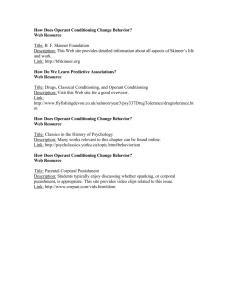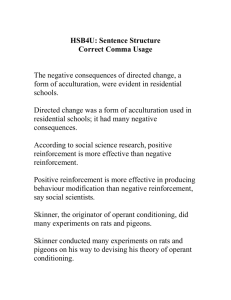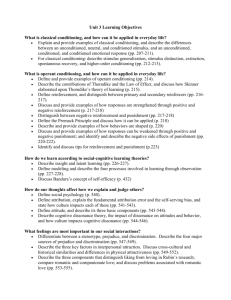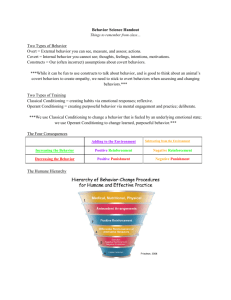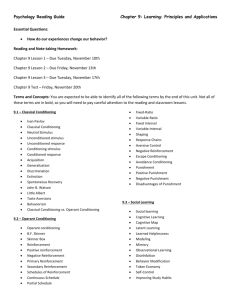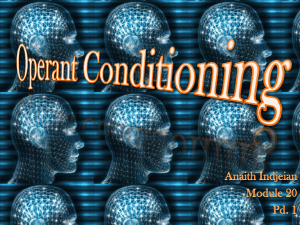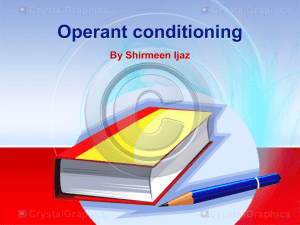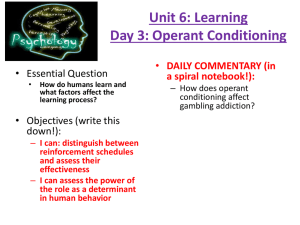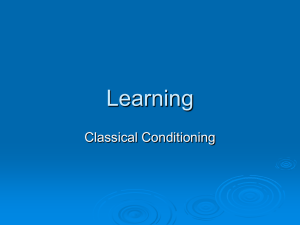Classical Conditioning * PPT Notes
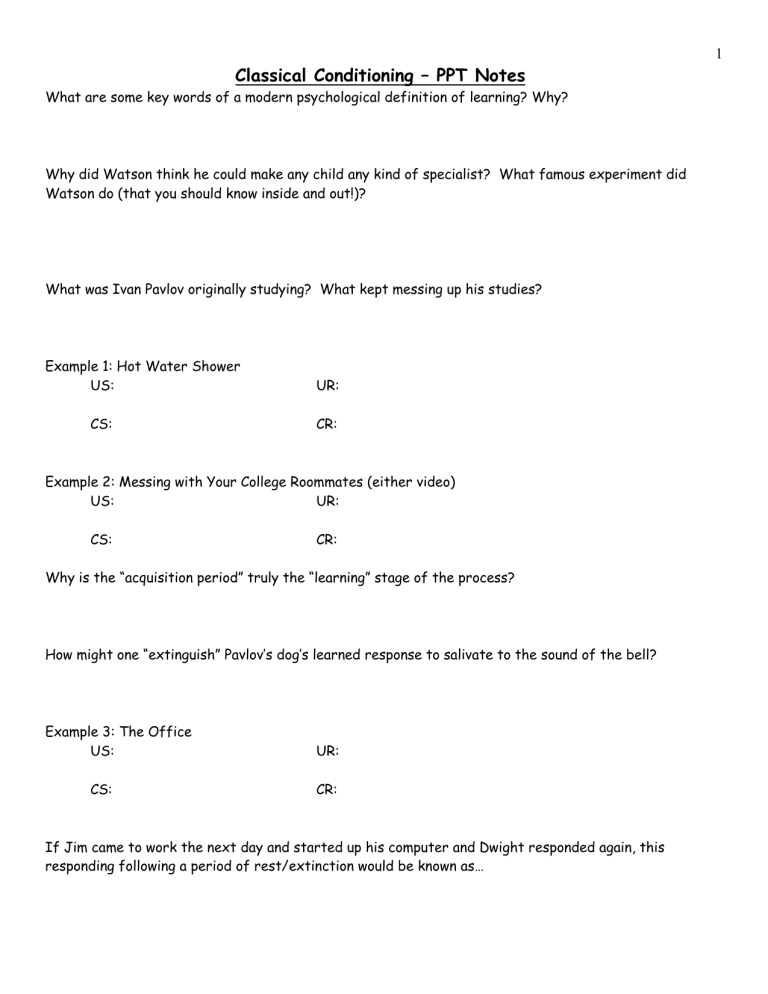
Classical Conditioning – PPT Notes
What are some key words of a modern psychological definition of learning? Why?
Why did Watson think he could make any child any kind of specialist? What famous experiment did
Watson do (that you should know inside and out!)?
What was Ivan Pavlov originally studying? What kept messing up his studies?
Example 1: Hot Water Shower
US: UR:
CS: CR:
Example 2: Messing with Your College Roommates (either video)
US: UR:
CS: CR:
Why is the “acquisition period” truly the “learning” stage of the process?
How might one “extinguish” Pavlov’s dog’s learned response to salivate to the sound of the bell?
Example 3: The Office
US:
CS:
UR:
CR:
If Jim came to work the next day and started up his computer and Dwight responded again, this responding following a period of rest/extinction would be known as…
1
If Dwight also responded to the sound of windows shutting down, this response to a stimuli similar to the original CS would be known as… the opposite of this is…
From our in class water demonstration, what are the following:
US: UR:
CS: CR:
To what other words did our participant respond? What term describes this phenomenon?
Once our participant had some practice at figuring out which word was the trigger word, the participant was better able to anticipate the exact word that needed to be said. The ability to distinguish here is known as…
Higher Order Conditioning and Babies:
US: UR:
CS1:
CS2:
CR:
CR:
How can desensitization treat phobic disorders? Describe an example.
What is vicarious classical conditioning?
Evolutionarily/functionally, why are taste aversions learned so readily?
2
Temporal Arrangements of CS & US
Type of Conditioning What it Looks Like (draw the pic)
DELAY
RANK: 1 ST
(BEST)
TRACE
Rank: 2 ND
BACKWARD
Rank: 3 RD
SIMULTANEOUS
Rank: 4 TH
Example
3
4
Operant Conditioning – PPT Notes
Comparing Classical and Operant Conditioning
-
Classical conditioning uses ____________ behavior.
-
Operant conditioning uses _____________ or _________________ behavior that is shaped by consequences.
Law of Effect – Author: _______________
-
Define it:
-
AKA: ______________ learning b/c…
-
Describe or draw the puzzle box and why he believed insight was not responsible for the learning taking place with the cats in the box.
B.F. Skinner – Master of Operant Conditioning
-
What does Skinner believe about free will?
-
Describe or draw the Skinner Box:
Reinforcement vs. Punishment
-
Define reinforcement:
-
Define punishment:
Types
Positive Reinforcement
Negative Reinforcement
Effects Examples
Positive Punishment
Negative Punishment
(aka omission training)
Primary vs. Secondary Reinforcement
Define / Give examples of each:
Immediate vs. Delayed Reinforcers
Give examples of each
How can one use the “The Premack Principle” to “delay gratification?”
Pro vs. Con of Punishment
Desirable Effects
Undesirable Effects
5
Escape Learning vs. Avoidance Learning
Example:
Define / Give examples of:
Shaping
Chaining
Schedules of Reinforcement
Schedule Defined Description of
Effects
Fixed Ratio
Examples
Variable Ratio
Fixed Interval
Variable Interval
6
Observational Learning
Why didn’t Skinner & Thorndike (and all behaviorists) believe that cognitions, perceptions, and expectations have any place in psychology?
Latent Learning – E.C. Tolman & The Rat Maze Experiment
Defined:
Rat Maze Experiment: Describe it…how do we know that there was “latent” learning?
Human example?
What’s a cognitive map?
Bandura’s Bobo Dolls
Describe the experiment and what was learned…
Abstract Learning
What can pigeons do that is quite astonishing and is an example of a potential schema?…Also, what’s a schema?
7
Insight Learning – Wolfgang Kohler & Chimpanzees
How is insightful learning like “ah-hah!” moments?
Describe the chimp experiment and why it was demonstrative of insightful learning.
Overjustification Effect
How does it affect intrinsic and extrinsic motivation? What is the danger in this?
Learned Helplessness
HOW SAD!!! What is the proposed human equivalent of learned helplessness? How does one overcome this?
Biological Predispositions
What is instinctive drift and how does it limit what we are capable of learning?
8


